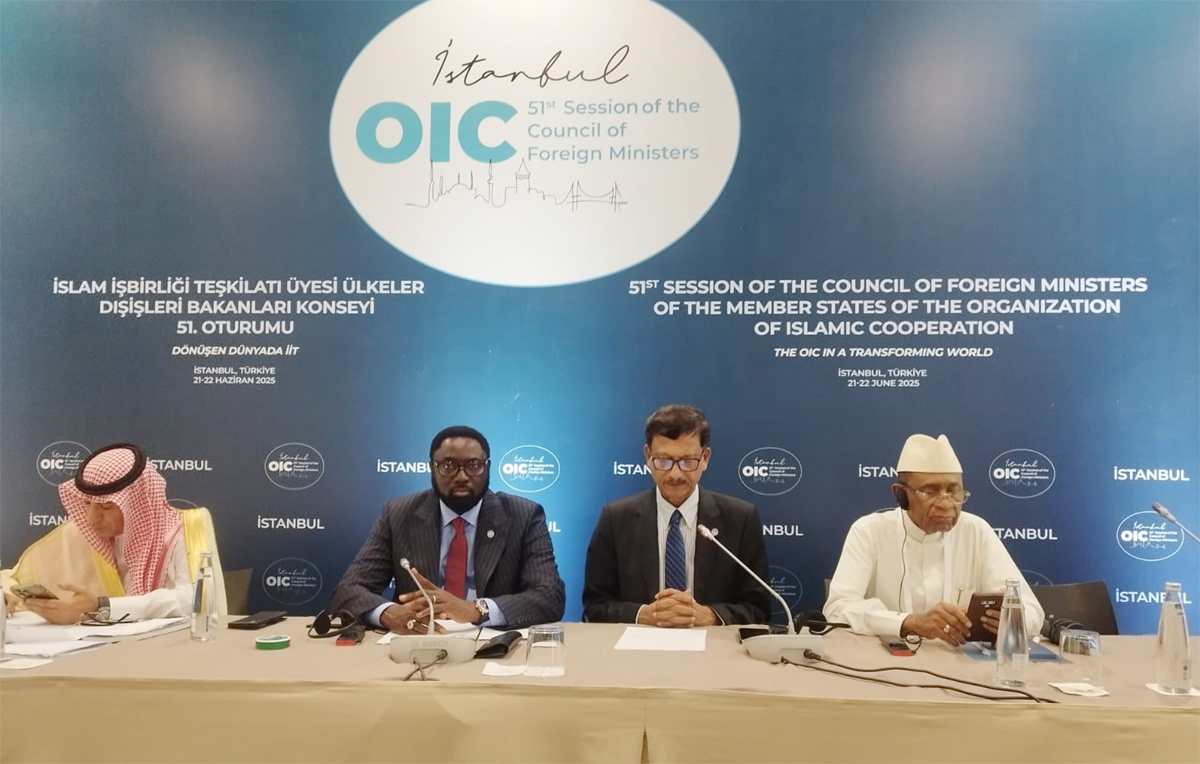
Diplomatic Desk: Foreign Adviser Md Touhid Hossain yesterday urged the Organisation of Islamic Cooperation (OIC) to assume a stronger and more coordinated role to ensure justice for persecuted Rohingyas, as Bangladesh faces growing humanitarian and security pressures of millions of displaced Myanmar nationals.
Addressing the OIC Ad Hoc Ministerial Committee meeting on accountability for human rights violations against Rohingyas, held in Istanbul, the Foreign Adviser praised the OIC’s consistent stance but warned of worsening conditions in both Myanmar and Bangladesh.
“The Ummah’s solidarity with the Rohingyas – one of the most persecuted Muslim minorities in the world – is both a moral and historical imperative,” he said in his written statement thanking the OIC for adopting a resolution on the plight of the Rohingya community in Myanmar.
Hossain noted that Bangladesh has shouldered extraordinary humanitarian responsibilities by hosting over 1.3 million forcibly displaced Rohingyas since the 2017 influx, which the United Nations described as a “textbook example of ethnic cleansing.”
He informed that more than 118,000 new arrivals were recorded since November 2023, fleeing renewed violence in Myanmar.
“The pressure on our economy, environment, and local communities is unsustainable. We are facing mounting humanitarian, developmental, and security-related challenges,” the Adviser said.
Recalling key diplomatic engagements in recent months, including the UN Secretary-General’s Ramadan Solidarity visit to Bangladesh and the visits of high-level officials from The Gambia, OIC, and ASEAN, he stressed the need for international accountability and justice to ensure safe and voluntary repatriation of Rohingyas.
Hossain pointed to a dramatic escalation in the Rakhine conflict, where the Arakan Army now controls most of the region, including the full stretch of the Bangladesh-Myanmar border. As of May 2025, around 587,000 people are internally displaced within Rakhine, while fresh waves of refugees have crossed into Bangladesh, he said.
Amidst growing global conflicts, Hossain warned of an “alarming downward trend of humanitarian support for Rohingyas in Bangladesh.”
Referring to the 2024 funding gap and the current Joint Response Plan for 2025-26, he said: “Only 68% of the UN estimated required fund for 2024 has been received last year… Due to fund shortage, UNICEF has closed learning facilities since 3rd of June. Moreover, WFP has cut the food ration twice.”
The Adviser reiterated Bangladesh’s call for the OIC to strengthen legal and diplomatic efforts, particularly supporting The Gambia’s case against Myanmar at the International Court of Justice (ICJ).
“OIC may engage the member states to provide required financial support to run case at ICJ by The Gambia. Now The Gambia will need our full solidarity, support and cooperation,” he said, adding, “Ensuring justice will boost confidence of the Rohingyas to return to Myanmar.”
He proposed that the OIC work closely with ASEAN, particularly under Malaysia’s current chairmanship, to urge Myanmar to end its atrocities and create conducive conditions for repatriation.
A ‘High-Level Conference on the Situation of Rohingya Muslims and Other Minorities in Myanmar’ will be organized on 30 September 2025 in New York at the sidelines of UNGA. Dhaka expects high-level participation from the OIC countries,” he added.
“For the Rohingya community, Bangladesh has done its part – perhaps more than its share. We now look to the OIC and the international community to uphold their moral and legal responsibilities. Our call yesterday is not just for charity, but also for justice, solidarity, and shared accountability,” he said.
The Adviser concluded by reaffirming Bangladesh’s unwavering commitment to the Rohingya cause.





